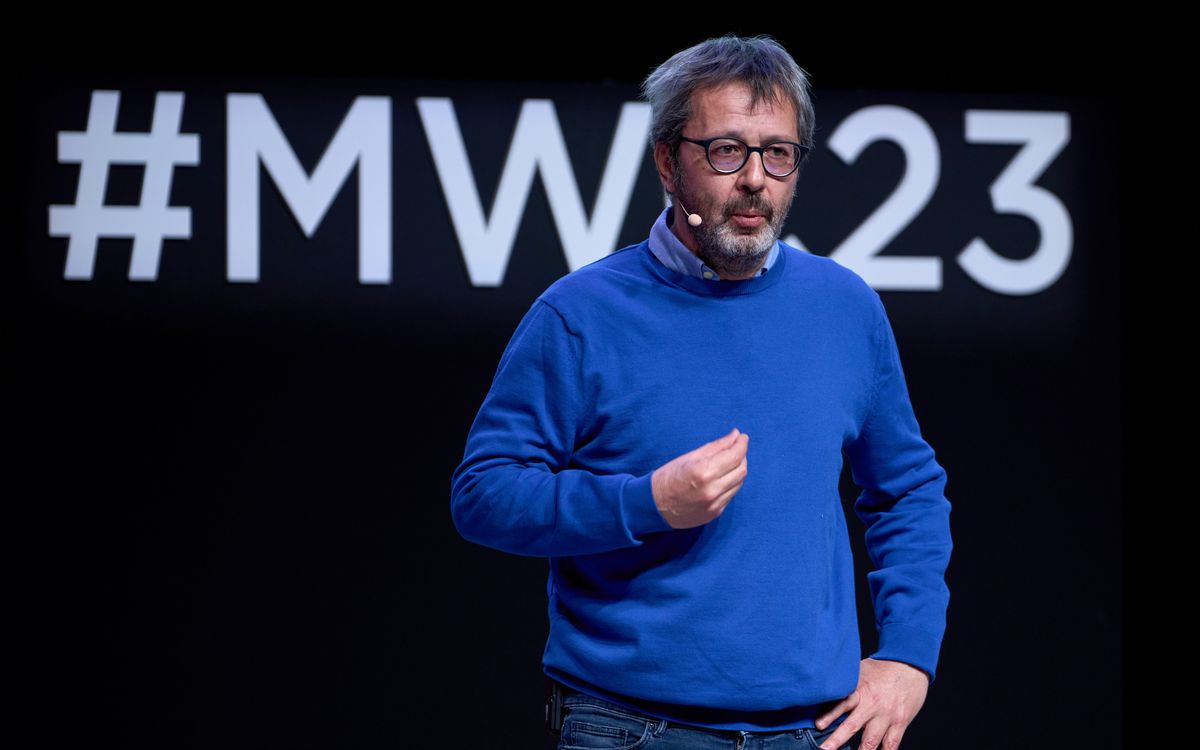Mental health and artificial intelligence open Sports Tomorrow Congress
- label.aria.viber Viber
- label.aria.whatsapp WhatsApp
- label.aria.twitter Twitter
- label.aria.facebook Facebook
- label.aria.messenger Messenger
- label.aria.link label.aria.tick Copy link
The Sports Tomorrow Congress, the sports innovation congress promoted by the Barça Innovation Hub, kicked off this Monday, as part of the Mobile World Congress, with a morning where a good part of the sessions focused on mental work and artificial intelligence.
The congress, which has more than 500 accredited attendees, mostly from the sports industry, opened with rally driver Albert Llovera, who gave a lesson in resilience in his talk 'Personal growth, attitude and opportunities', in which he explained how he recovered after the skiing accident he suffered in 1985 that left him in a wheelchair; a circumstance that later even led him to collaborate with NASA on a muscle stimulation project.
Edu Castro: Minimal organization at the service of infinite talent
Continuing with mental work, in another of the sessions, Edu Castro, coach of the FC Barcelona rink hockey team, and Laura Suárez, psychologist for the same team, explained how to work with high performance like theirs. Castro acknowledged that he likes to create a "work climate where dissent is accepted" and with a philosophy where the players find "minimal organization at the service of infinite talent".
Suárez revealed the specific psychological model of the "Barça character", as he puts it, based on the players' "emotional stability, inner strength, ability to adapt and competitive development". He also discussed the mental warm-up exercises that athletes perform before a match and the group dialogue sessions that they carry out monthly to improve the team's mental situation.
Bojan: I did a good job at Barça and none of the adversities stopped me
Ex-Blaugrana Bojan Krkic, who made his debut in 2007 when just 17 years old, was the protagonist of another session on emotional management, speaking to journalist Raül Llimós about how he experienced his arrival in the sporting elite when he was a youngster. "What I wanted was to have fun, I was not aware of the magnitude of what was happening at the age of 17", he said. Bojan recalled that it is necessary to break away from labels, accept one's own limits, enhance one's virtues and offer tools to young athletes.
To be in the first team for four seasons and score 41 goals, Bojan had to live with a lot of pressure and had to deal with the high expectations. Krkic said trust "is not given as a gift by anyone" and that "we must avoid the view that the football player is a product." He was very clear about his years in the first team: "I did a good job at Barça and none of the adversities stopped me".
As for pulling out of the 2008 European Championship for reasons of mental health, one of the biggest decisions of his career, Bojan acknowledged that he has never regretted it. "Overcoming my anxiety was more important than winning the competition."
Artificial intelligence and NASA experts
The rest of the morning revolved around artificial intelligence (AI), a topic that was the focus of three more talks on sports performance, data collection and above all the potential of artificial cognition to change the way we understand and manage sports practice.
One of the most eagerly awaited debates featured NASA engineers Howard Hu and Carlos García Galán, responsible for the project that will bring man to the moon after an absence of 50 years.
The engineers explained that the exploration of the moon will serve as a preliminary phase for getting to Mars in the future. They presented details of the ORION spacecraft with videos that have never been released before, as well as of tests and missions carried out within the agency. Hu and García Galán also discussed the mental and performance challenges faced by the astronauts who will lead these missions where AI and data management play an important role.
The first block of the congress was brought to a close by a session led by FC Barcelona nutritionists Toña Lizarraga and Mireia Porta, in collaboration with Heura, which discussed the connections between food and brain.
In this session, interesting questions were raised such as 'why do we eat what we eat?', which served to look in depth at how our emotions or even media marketing influence decisions about our food. "Our microbiota and our brain need varied foods", concluded Dr. Sari Arponen, who also participated in the session.
.
- label.aria.viber Viber
- label.aria.whatsapp WhatsApp
- label.aria.twitter Twitter
- label.aria.facebook Facebook
- label.aria.messenger Messenger
- label.aria.link label.aria.tick Copy link

